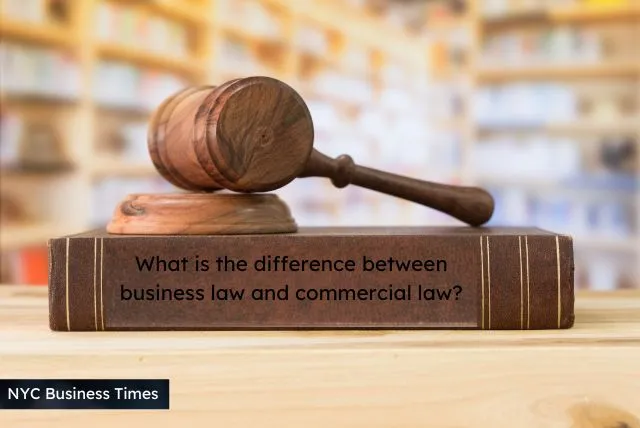Business law and commercial law are terms often used interchangeably, but they refer to different areas of the legal field. Business law governs the setup and operation of companies, covering aspects such as contracts, taxes, and employment laws. On the other hand, commercial law focuses on transactions, including the sale of goods, trade, and commerce. Understanding the difference between these two fields is crucial for anyone navigating the world of business. This article will break down the key difference between business law and commercial law.
What is Business Law?

Business law encompasses all the legal aspects involved in running a business. It includes the laws that dictate how businesses should operate, starting from the moment they are formed. Business law covers a wide range of topics, such as:
- Company formation: Rules on how to start and register a business.
- Employment law: Employee contracts, rights, and working conditions.
- Tax law: Governing the taxes businesses need to pay.
- Contract law: Agreements between businesses and their clients or suppliers.
In summary, business law is more focused on the structure and internal operations of businesses.
What is Commercial Law?

Commercial law deals specifically with commerce and trade. It is concerned with transactions and how businesses engage with one another or with consumers. The primary focus of commercial law includes:
- Sales of goods: Legal rules around buying and selling products.
- Trade practices: Regulations governing fair trade and competition.
- Consumer rights: Laws ensuring that consumers are treated fairly.
- Corporate finance: Legal aspects of how companies raise and manage their capital.
Essentially, commercial law focuses on transactions, and it is narrower in scope compared to business law.
Key Differences Between Business Law and Commercial Law

Although both fields are related to the operation of businesses, their scope differs. Here are the main differences:
- Scope: Business law covers a broader range of topics, while commercial law focuses solely on transactions.
- Objective: Business law aims to ensure businesses are compliant with the law, while commercial law governs how businesses interact commercially with others.
- Example: Hiring employees would fall under business law, while buying and selling goods falls under commercial law.
Read More: What is the difference between a Finance Controller and a Finance Director?
How Business Law Impacts Business Structure

Business law has a direct impact on the way businesses are structured. Whether a business is a sole proprietorship, partnership, or corporation, business law ensures that the legal setup is clear and functional. Business structure affects:
- Liability: How much personal liability the owners have.
- Taxation: How the business will be taxed by the government.
- Ownership: Who owns the business and how responsibilities are divided. These factors are governed under business law to ensure businesses comply with legal standards.
How Commercial Law Governs Business Transactions

Commercial law comes into play when businesses engage in buying, selling, and trading. It ensures:
- Contract enforcement: Ensuring that agreements between businesses are legally binding.
- Dispute resolution: Providing a legal framework to resolve disputes over commercial deals.
- Trade regulation: Ensuring businesses follow national and international trade laws. Commercial law plays a crucial role in making sure that business deals are carried out legally and fairly.
Overlapping Areas Between Business Law and Commercial Law

While business law and commercial law are distinct, there are areas where they overlap. For example:
- Contracts: Both fields deal with contracts, but business law focuses on contracts within a company, while commercial law handles contracts between businesses.
- Intellectual property: Both fields involve intellectual property laws, such as trademarks and copyrights, but from different perspectives.
- Regulatory compliance: Both business law and commercial law require businesses to follow certain regulations, but the specific laws vary.
Why Understanding These Laws is Important for Businesses

For any business owner, understanding the difference between business law and commercial law is essential for several reasons:
- Avoiding legal disputes: Knowing the applicable law can help businesses avoid unnecessary legal problems.
- Ensuring compliance: Businesses must follow laws governing both their internal operations and commercial transactions.
- Better decision-making: A clear understanding of these laws can lead to more informed business decisions, particularly when entering contracts or forming partnerships.
Read More: Outsourced Finance Director: Why Your Business Needs One in 2024
Recent Developments in Business and Commercial Law (2024)

The legal landscape for businesses is constantly evolving, and 2024 has seen some important changes:
- Digital contracts: The rise of e-commerce has increased the importance of laws governing digital contracts and online transactions.
- Consumer protection: New regulations are being introduced to better protect consumers in online marketplaces.
- Sustainability laws: Many countries are now implementing laws that require businesses to adopt sustainable practices. These developments highlight the importance of staying informed about both business and commercial law.
Conclusion:
In conclusion, business law and commercial law are two separate but related fields of law that every business owner should understand. Business law governs the structure and internal operations of businesses, while commercial law regulates how businesses engage in transactions. Understanding both areas is crucial for staying compliant with the law, avoiding disputes, and making informed business decisions.
FAQ:
Q1: Is business law broader than commercial law?
Yes, business law covers a wider range of topics, including employment, tax, and company formation, while commercial law focuses specifically on transactions.
Q2: Do I need a separate lawyer for business law and commercial law?
While some lawyers specialize in one area, many lawyers handle both business and commercial law.
Q3: Does commercial law cover international trade?
Yes, commercial law includes laws that govern both national and international trade.
Q4: What is the difference between a contract under business law and commercial law?
Business law contracts relate to internal business operations, while commercial law contracts involve transactions between businesses or consumers.
Q5: Is consumer protection part of business law or commercial law?
Consumer protection typically falls under commercial law, as it deals with transactions between businesses and consumers.
